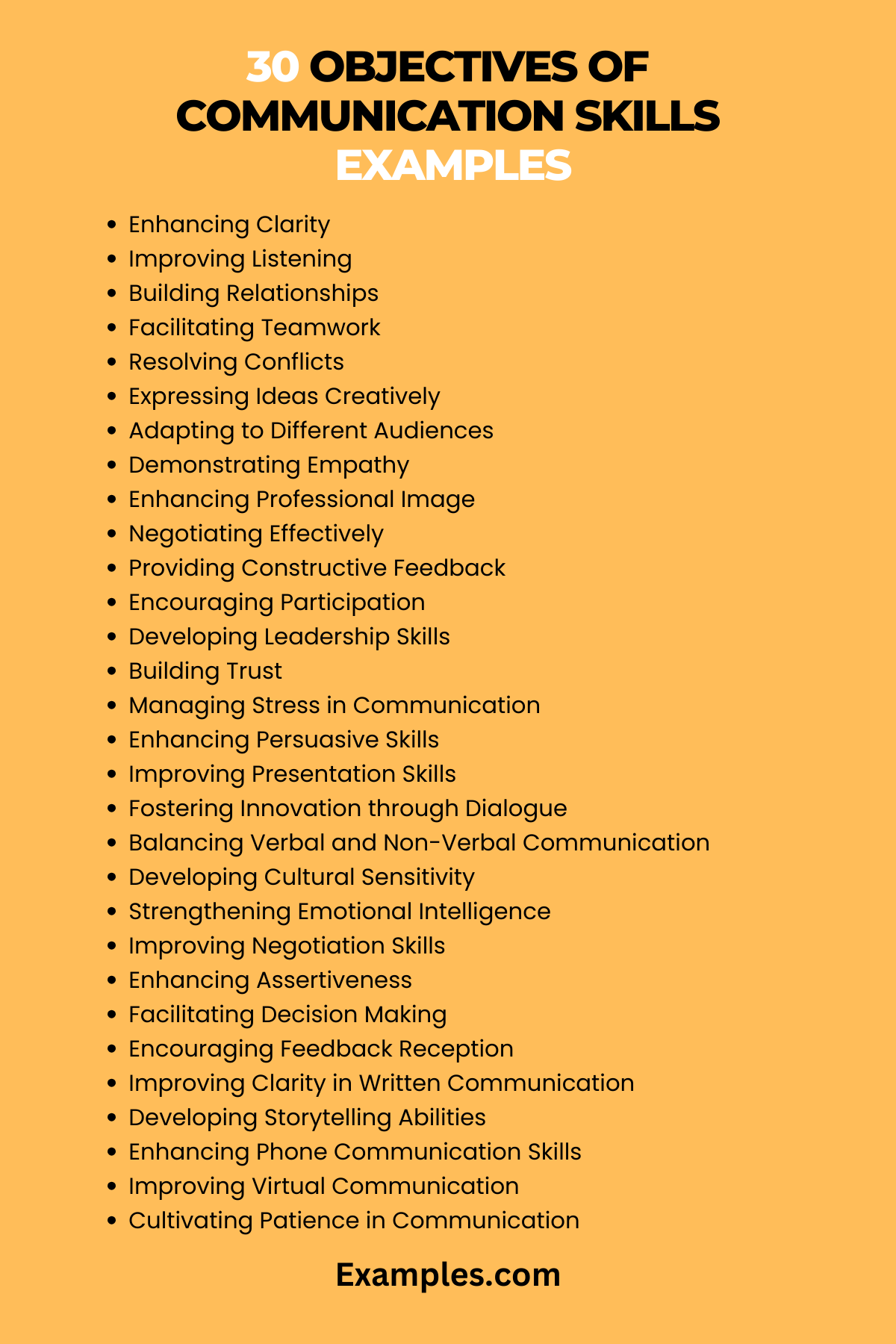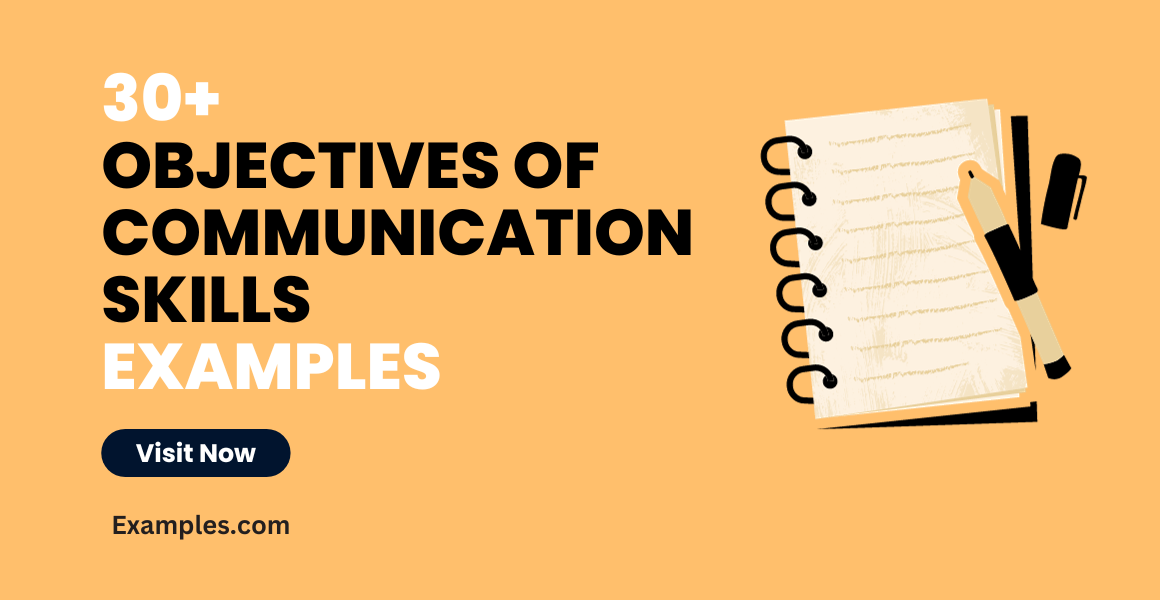29+ Objectives of Communication Skills Examples
Dive into the world of Objectives of Communication Skills with our comprehensive guide, enriched with practical sentence examples. This resource meticulously outlines the fundamental goals and purposes behind effective communication. From professional dialogues to personal conversations, we cover a spectrum of communication examples, emphasizing how strategic communication can lead to successful outcomes. Ideal for anyone from business leaders to social connectors, this guide illuminates the pathways to achieving clarity, empathy, and effectiveness in every interaction. Whether you’re honing your professional skills or enhancing personal relationships, understanding these objectives is key to impactful communication.
30 Objectives of Communication Skills
Communication skills are essential for personal and professional success. These skills facilitate interaction, understanding, and collaboration, making them vital in diverse settings. In this article, we explore 30 unique objectives of communication skills, each followed by a practical example and brief explanation.

- Enhancing Clarity: Aim to communicate ideas clearly and concisely.
Example: In a project meeting, instead of saying “We need to do better,” say “Let’s increase our sales by 10% this quarter.” This approach removes ambiguity, ensuring everyone understands the exact goal. - Improving Listening: Focus on actively listening to others.
Example: In a conversation, nod and respond with phrases like “I understand” to show you’re engaged and comprehending the speaker’s point. - Building Relationships: Use communication to establish and strengthen relationships.
Example: Greet colleagues with a smile and inquire about their well-being to create a positive work environment. - Facilitating Teamwork: Enhance collaboration through effective communication.
Example: During team projects, regularly update everyone on progress and challenges, fostering a cooperative team spirit. - Resolving Conflicts: Employ communication to manage and resolve disputes.
Example: When disagreements arise, encourage open discussion to find a mutual solution, emphasizing understanding and respect. - Expressing Ideas Creatively: Use communication to share innovative thoughts.
Example: In brainstorming sessions, present your ideas through stories or analogies to make them more engaging and memorable. - Adapting to Different Audiences: Tailor your communication style to suit various listeners.
Example: When explaining technical details to non-experts, use simpler language and avoid jargon. - Demonstrating Empathy: Show understanding and consideration in your communication.
Example: When a colleague is upset, listen attentively and offer supportive words. - Enhancing Professional Image: Communicate in a manner that reflects positively on you.
Example: In emails, use a professional tone and proper grammar to convey competence and professionalism. - Negotiating Effectively: Use communication for successful negotiations.
Example: In discussions, clearly state your needs while being open to understanding the other party’s perspective. - Providing Constructive Feedback: Offer feedback that is helpful and encouraging.
Example: When reviewing a team member’s work, highlight strengths before suggesting improvements. - Encouraging Participation: Create an environment where everyone feels comfortable speaking.
Example: In meetings, invite quieter members to share their thoughts. - Developing Leadership Skills: Use communication to lead and inspire others.
Example: As a leader, communicate your vision clearly to motivate and guide your team. - Building Trust: Establish trust through honest and open communication.
Example: Share relevant information transparently with your team to foster trust and reliability. - Managing Stress in Communication: Keep calm and composed in all interactions.
Example: In stressful situations, take deep breaths before responding to maintain a level-headed approach. - Enhancing Persuasive Skills: Persuade others effectively through your words.
Example: To convince your team about a new strategy, present clear benefits and address potential concerns. - Improving Presentation Skills: Deliver information in an engaging and organized manner.
Example: In presentations, use visuals and stories to keep the audience interested and convey your message effectively. - Fostering Innovation through Dialogue: Encourage new ideas through open communication.
Example: During team meetings, ask open-ended questions to stimulate creative thinking. - Balancing Verbal and Non-Verbal Communication: Align your words with body language.
Example: When agreeing with someone, nod and maintain eye contact to reinforce your agreement. - Developing Cultural Sensitivity: Communicate respectfully with people from diverse backgrounds.
Example: Learn basic greetings in different languages to show respect in a multicultural workplace. - Strengthening Emotional Intelligence: Recognize and respond to emotions in communication.
Example: If a colleague is frustrated, acknowledge their feelings before discussing solutions. - Improving Negotiation Skills: Use effective communication in negotiations.
Example: In salary negotiations, present your achievements confidently and listen to the employer’s perspective. - Enhancing Assertiveness: Communicate your needs and opinions respectfully but firmly.
Example: If overloaded with work, explain your situation to your manager and request a realistic workload. - Facilitating Decision Making: Use clear communication to aid in decision-making processes.
Example: Present pros and cons objectively when discussing options with your team. - Encouraging Feedback Reception: Welcome and act on feedback received.
Example: After a presentation, ask for audience feedback and use it to improve future presentations. - Improving Clarity in Written Communication: Write clearly and effectively.
Example: In reports, use headings and bullet points to make your text easily understandable. - Developing Storytelling Abilities: Use stories to make your communication more engaging.
Example: Share personal experiences relevant to the topic to illustrate your points in a relatable way. - Enhancing Phone Communication Skills: Communicate effectively over the phone.
Example: Speak clearly and confirm understanding by summarizing key points during phone calls. - Improving Virtual Communication: Adapt to online communication platforms.
Example: Use clear and concise language in virtual meetings and ensure your video and audio are working properly. - Cultivating Patience in Communication: Be patient and give others time to speak.
Example: In discussions, wait for others to finish their thoughts before responding.
Goals and Objectives of Communication Skills
Effective communication skills are fundamental in achieving personal and professional milestones. They encompass the ability to convey thoughts, ideas, and feelings with clarity and empathy. These skills aid in conflict resolution, enhance leadership qualities, and improve interpersonal relationships, making them crucial for success in various life aspects.

- Set Realistic Communication Targets:
Example: Aim to resolve misunderstandings in conversations by asking clarifying questions. This ensures that you fully understand the other person’s perspective. - Develop a More Inclusive Communication Approach:
Example: In group settings, make an effort to include everyone in the discussion, ensuring that all voices are heard and valued. - Enhance Non-Verbal Communication Skills:
Example: Use positive body language, like maintaining eye contact and nodding, to show engagement in conversations. - Improve Public Speaking Skills:
Example: Practice speaking in front of a mirror or recording yourself to become more confident and articulate in public speaking scenarios. - Cultivate Active Listening Abilities:
Example: During conversations, repeat or paraphrase what the other person said to show that you are actively listening and understanding them. - Advance Persuasive Communication:
Example: Use facts and emotional appeals in presentations to persuade your audience effectively. - Increase Empathy in Communication:
Example: When someone shares a problem, express empathy by acknowledging their feelings and showing genuine concern. - Enhance Clarity in Emails and Written Reports:
Example: Use simple language and bullet points in emails to convey your message clearly and succinctly. - Build Assertiveness Without Aggression:
Example: Express your opinions firmly yet respectfully, without belittling others. - Strengthen Relationship Building Through Communication:
Example: Regularly check in with friends or colleagues to nurture relationships through consistent, thoughtful communication.
Types of Communication Objectives
Communication objectives vary depending on the context and desired outcomes. They can range from improving interpersonal relationships to enhancing professional rapport. Objectives include developing listening skills, mastering non-verbal cues, and excelling in persuasive communication. Each objective plays a pivotal role in effective information exchange.

- Mastering Clear Verbal Communication:
Example: Use specific and direct language when giving instructions to avoid confusion and ensure clear understanding. - Developing Constructive Criticism Skills:
Example: When offering feedback, focus on the behavior rather than the person to keep the critique constructive and objective. - Improving Emotional Intelligence in Conversations:
Example: Be aware of and respond appropriately to your own emotions and those of others during discussions. - Enhancing Digital Communication Proficiency:
Example: Learn to convey tone and intent effectively in digital communications, such as emails and social media posts. - Fostering Effective Group Communication:
Example: In group settings, encourage open dialogue and the sharing of diverse perspectives. - Cultivating Cultural Sensitivity in Global Communication:
Example: Learn about cultural nuances and adjust your communication style accordingly when interacting with individuals from different backgrounds. - Advancing Negotiation Skills in Communication:
Example: Use a combination of assertiveness and empathy during negotiations to reach mutually beneficial outcomes. - Increasing Responsiveness in Communication:
Example: Respond promptly to emails and messages to maintain effective and efficient communication. - Building Public Speaking Confidence:
Example: Join a public speaking club to practice and receive constructive feedback, enhancing your confidence and ability. - Improving Listening for Comprehension:
Example: Focus on understanding the speaker’s message instead of thinking about your response while they are still speaking.
Objectives of Communication Skills in the Workplace
In the workplace, communication skills are integral for teamwork, productivity, and professional growth. Objectives include fostering a collaborative environment, ensuring clear and concise information exchange, and building strong relationships with colleagues and clients. Effective workplace communication also involves adapting to different communication styles and technological mediums.

- Promoting Open and Honest Team Communication:
Example: Encourage team members to share ideas and concerns openly in meetings, fostering a transparent and collaborative environment. - Developing Effective Conflict Resolution Skills:
Example: When conflicts arise, focus on finding a solution that addresses the concerns of all parties involved. - Enhancing Email Etiquette for Professionalism:
Example: Use a clear and professional tone in emails, along with proper greetings and closings, to maintain a professional image. - Improving Interdepartmental Communication:
Example: Regular interdepartmental meetings can help bridge gaps and enhance overall organizational effectiveness. - Cultivating Leadership Communication Skills:
Example: As a leader, regularly communicate your vision and goals to your team to ensure alignment and motivation. - Facilitating Effective Remote Communication:
Example: Utilize video conferencing and collaborative tools to maintain clear communication with remote team members. - Building Strong Client Relationships Through Communication:
Example: Regularly update clients on project progress and actively seek their feedback. - Enhancing Presentation Skills for Impact:
Example: Practice your presentations with colleagues to receive feedback and refine your delivery for maximum impact. - Improving Feedback Reception from Colleagues:
Example: Actively seek and constructively respond to feedback from colleagues to foster personal and professional development. - Advancing Communication Skills for Team Leadership:
Example: Conduct regular one-on-one meetings with team members to understand their challenges and provide tailored support.
What Are the Main Objectives of Effective Communication Skills in General?
Effective communication skills are crucial in both personal and professional contexts. The main objectives of effective communication skills generally revolve around enhancing understanding, building relationships, and facilitating effective interactions. This comprehensive guide will delve into the core objectives, emphasizing their importance and applicability in everyday scenarios.
Enhancing Understanding and Clarity
The primary objective of effective communication skills is to convey messages clearly and unambiguously. Whether in verbal or written form, clarity ensures that the intended message is understood as it was meant to be. This reduces misunderstandings and fosters a more productive exchange of ideas.
Building and Maintaining Relationships
Communication is the cornerstone of all relationships. Effective communication skills help in building rapport, trust, and understanding between individuals. In personal relationships, this means being able to share thoughts and feelings openly. In professional settings, it translates to maintaining professional relationships, networking, and collaborating effectively with colleagues and clients.
Facilitating Decision Making and Problem Solving
Good communication is key to decision-making and problem-solving processes. It involves gathering information, discussing options, and reaching consensus. Effective communication skills ensure that all viewpoints are considered and that decisions are made based on a comprehensive understanding of the situation.
Encouraging Transparency and Trust
Transparency in communication builds trust among individuals and teams. By communicating openly and honestly, individuals can create an environment of mutual respect and confidence. This is especially important in a professional setting, where transparency can lead to better teamwork and collaboration.
Fostering Adaptability and Flexibility
Effective communication skills also involve the ability to adapt one’s communication style to different people and situations. This flexibility ensures that the message is not only conveyed but also received well, regardless of the audience or context.
Promoting Feedback and Continuous Improvement
An important objective of communication skills is the ability to give and receive feedback constructively. This facilitates continuous personal and professional development, helping individuals and organizations to grow and improve continuously.
Enhancing Persuasion and Influence
Effective communication skills are crucial for persuading and influencing others. Whether it’s a sales pitch, a presentation, or a negotiation, being able to communicate persuasively can lead to more favorable outcomes.
Improving Conflict Resolution
Conflicts, whether personal or professional, can be resolved more effectively through good communication. Understanding all sides of an issue and expressing viewpoints constructively can lead to resolutions that are acceptable to all parties involved.
Cultivating Cultural Sensitivity
In today’s globalized world, effective communication includes being culturally sensitive. This means understanding and respecting cultural differences in communication styles and adapting accordingly to ensure effective and respectful interactions.
Supporting Emotional Expression and Empathy
Effective communication skills allow for the expression of emotions and the demonstration of empathy. This is vital in creating emotional connections and understanding, which are essential components of strong relationships.



